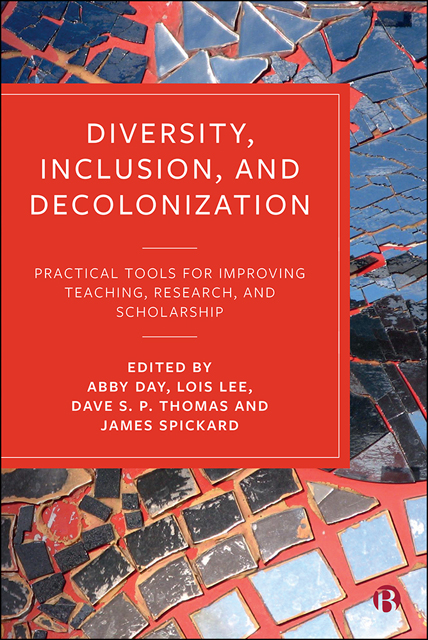 Diversity, Inclusion, and Decolonization
Diversity, Inclusion, and Decolonization Book contents
- Frontmatter
- Contents
- List of Figures and Tables
- Notes on Contributors
- Acknowledgements
- Typographical Note
- Introduction: Why Diversity, Inclusion, and Decolonization Matter
- Part I Changing Universities
- Part II Diversifying Curricula
- Part III Diversifying Research and Scholarship
- Part IV Overcoming Intellectual Colonialism
- Epilogue: What We Have Learned
- Index
10 - How Would a World Sociology Think? Towards Intellectual Inclusion
Published online by Cambridge University Press: 13 October 2022
- Frontmatter
- Contents
- List of Figures and Tables
- Notes on Contributors
- Acknowledgements
- Typographical Note
- Introduction: Why Diversity, Inclusion, and Decolonization Matter
- Part I Changing Universities
- Part II Diversifying Curricula
- Part III Diversifying Research and Scholarship
- Part IV Overcoming Intellectual Colonialism
- Epilogue: What We Have Learned
- Index
Summary
It is no secret that sociology was born in early 19th-century Europe and assumed its present intellectual form in the mid-20th-century United States (US). It was a new science, intended to uncover the ways that society shapes human life. As Anthony Giddens (1976) noted, however, the early sociologists assumed, falsely, that Europe was the leading edge of world history. Marx, Durkheim, Weber, and others sought to understand the origins and consequences of industrialization, of the growth of capitalism, of increasing social inequality, and of the breakdown of traditional mores – all of which were European concerns. Giddens argued that much of this work “is an attempt to rethink the foundations of liberalism in conditions in which liberal individualism and its base in social theory, namely, utilitarian philosophy … were manifestly inappropriate” (1976, pp 725– 726). The founders thus concentrated their sociology on matters that explained their own situation. They underplayed the role of colonialism in European ascendance, and they took their new discipline’s core ideas from their own culture.
Mainstream American sociologists, working later and in the context of growing US world dominance, assumed that these core ideas would explain the rest of the world. They saw history as the gradual ‘Westernization’ of traditional societies (Rostow, 1971), a process that involved intellectual as well as material development. Sociologists expected those societies’ elites to discard their ‘traditional’ views of the world and assume ‘modern’ ones (Inkeles and Smith, 1974). Even those few who did not highlight industrialization and modernity, such as W.E.B. Du Bois, used European concepts to understand the world.
Some sociological theorists have wrestled with newer ways to describe contemporary ‘modernity’: “late” (Giddens, 1991), “post” (Jameson, 1991), “liquid” (Bauman, 2000), “reflexive” (Beck et al, 1994), or other (Foucault, 1977). All, however, centre their attention on the global North. Even sociologists inspired by Marx’s emphasis on the interplay between class structure and ideology treat the North as the hub of the contemporary world system (for example, Wallerstein, 2004; Burawoy, 2015). All use concepts native to European and American intellectual traditions to explain the world.
- Type
- Chapter
- Information
- Diversity, Inclusion, and DecolonizationPractical Tools for Improving Teaching, Research, and Scholarship, pp. 157 - 169Publisher: Bristol University PressPrint publication year: 2022
